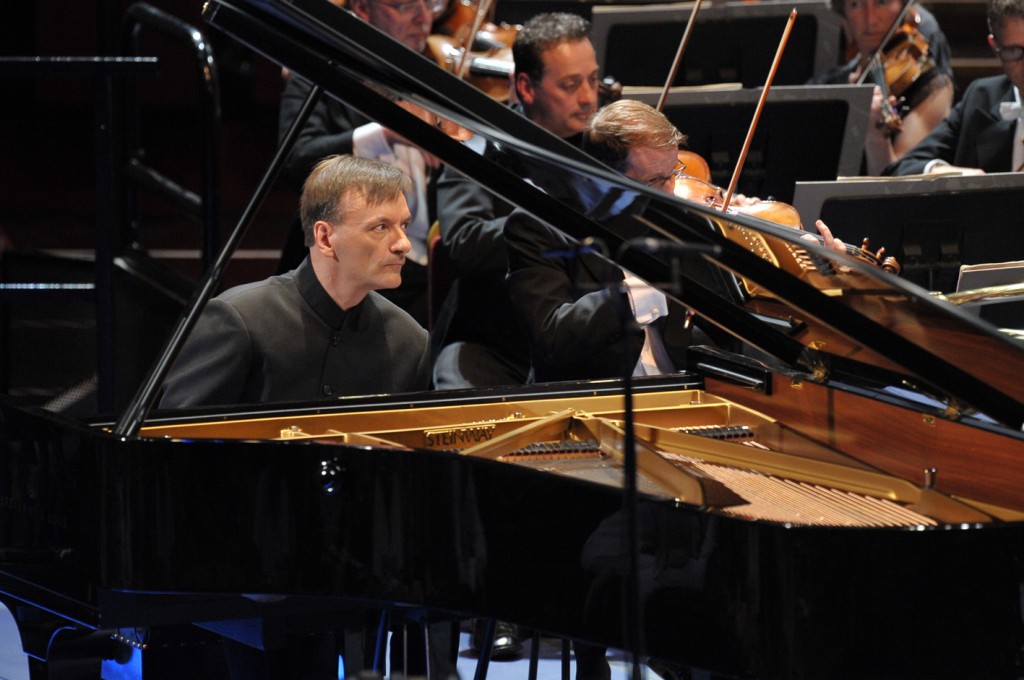Published by Daily Mail
Prom 1: First Night of the Proms 2013 (Royal Albert Hall)
I’ve never been to a First Night of the Proms before: it’s so much more elegant and stylish than the Last, and this one had a musical coherence of ambrosial heights. Or perhaps I should say Neptunian depths, since the overriding theme was oceanic, and the tide of surging waves bathed the audience in a symphony of wonder.
Sakari Oramo conducted the BBC Symphony Orchestra, Chorus and vibrant Youth Choir through Britten’s ‘Four Sea Interludes’ from Peter Grimes and Vaughan Williams’ majestic Sea Symphony. These provided the Prom’s pelagic zone upon which the other items glistened, from the half-light of the world premiere of Julian Anderson’s Harmony to the dazzling highlight of Rachmaninov’s Rhapsody on a Theme of Paginini and Lutoslawski’s Variations on that same theme. The 119th Proms Season opened with quiet meditation and serene reflection rather than blustery fanfares.
Anderson’s Harmony got going (just) with more agitated baton-waving than audible sensation: the pianissimo was very issimo, beginning with ear-straining whispers of stillness out of which emerged the diffuse plucking of violins and shadowy meanderings of trumpets. It was a floaty piece of musical spaghetti, made all the more bearable for its brevity.
Britten’s ‘Four Sea Interludes’ brought the natural elements together: from moonlight stillness to sparkling sunlight to thunderous tempest, Oramo grasped the composer’s drama perfectly.
But the highlight of the evening was undoubtedly Stephen Hough, whose remarkable muse injected Rachmaninov’s Rhapsody on a Theme of Paganini with both pensive depths and jazzy panache. No matter what the hemi-demi-semi-quaver provocation, Hough gave us syncopated solemnity, haunting evil and that ‘greatest hit’ melody as though he were consorting with live demons and negotiating his way through the rollercoaster of romance to the summit of love. It was transcendent; Hough was wild, witty and inspired; the crowd roared.
The Lutoslawski Variations which followed seemed like an encore. It was originally composed for two pianos, but Hough seems to have 20 delicate fingers anyway. The more obscure variations in the rhythms and harmonies of this new arrangement allowed more time to appreciate the intricate orchestral shades and layers. It was a bold and striking rendition; Hough glowed with passion; the Promenaders, once again, roared and cheered the genius of the Maestro.
Vaughan Williams’ A Sea Symphony flooded the entire second half, but, for me, Hough was still reverberating around the dome. As much as I can admire the epic depth and symphonic breadth of this piece, I have never been able to overcome Walt Whitman’s verbal dirge. The BBC Symphony Chorus and Youth Choir were metaphysically epic and glorious, and Oramo led them and his orchestra into a mystical union of sacred oratorio. But I think this is the first time I’ve listened to the whole piece with the Whitman’s gurgling words before me, and it only served to draw attention to the melodic-lyrical incongruities. ‘Behold, the sea’, the Chorus declaims, as though God Himself were creating the earth, sea and sky ex nihilo. But then we get ‘itself’ – ‘..the sea itself’ – and this has always troubled me. The composer endows the second syllable of this meagre word with such an awesome semibreve of harmonic majesty that you would think the tenors and basses were proclaiming ‘Sanctus!’ to the heavens.
Still, that’s not the choirs’ fault, and both of them undulated and bubbled with the sublime and spiritual, from the ‘vast Rondure’ to the ‘fleck of foam’. The soloists Roderick Williams and Sally Mathews were intrepid in the trackless recitatives; their diction was crystal. They endured with a few beads of perspiration through the (very long) journey to touch the soul of the piece.
It was a mystical, nautical and poetic First Night. Vaughan Williams spanned time and space, but Stephen Hough was the star.

